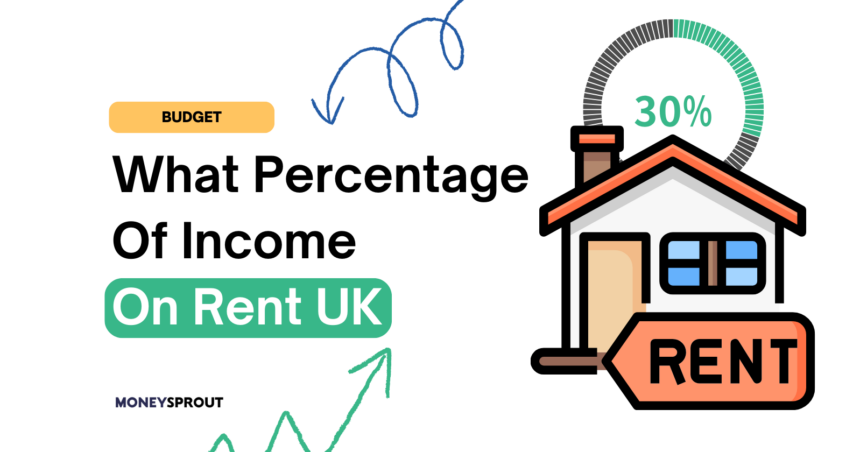Finding the perfect rental space is like discovering your own sanctuary to call home. With nearly one in five households in the UK residing in the private rented sector – totaling around 4.4 million households – the quest for the ideal rental has never been more competitive.
That being said, knowing your finances pays off. Ensure you’re equipped with the knowledge and foresight needed to get through this smoothly. Let’s break down the UK rental cost, how much of your income goes towards it, plus helpful tips and more.
Quick Overview
Quick Overview
Determining what percentage of income should go towards rent in the UK is key to financial stability. The rule of thumb suggests that rent should not exceed 30% of your gross income. However, factors like location, property type, and lifestyle choices impact rent affordability.
How Much of My Income Should I Set Aside for Rent?
With homeownership becoming increasingly unattainable for many, renting remains a popular choice. While it may seem costly in the long run, renting offers the freedom of personal space without being tied down to a mortgage.
Generally speaking, the most widely accepted guideline is allocating around 30% of your gross income to rent. This ensures financial stability while enjoying comfortable living. For example, if your monthly income is £2,297, a monthly rent budget of roughly £689 would be a good idea.
Here’s a breakdown of common approaches to determining rent affordability:
- The 30% Rule: Established in 1981, this rule suggests that spending over 30% of income on housing can cause renters to be “cost-burdened.” However, following this guideline may be tricky in pricier urban areas because of elevated living costs.
- The Under 30% Rule: For those managing debt or loans, opting for rent below 30% of monthly income allows more financial flexibility to tackle other financial obligations. Rent may also be lower if you live in an affordable area, so opting for this rule is the better choice.
- The 50/30/20 Rule: This method divides take-home pay into categories: 50% for needs, 30% for wants, and 20% for savings and debt payments. If rent surpasses 30% of gross income, minimizing other monthly expenses can help maintain a stable budget.
Ultimately, rent affordability is a personal decision influenced by many reasons. Some prioritize convenience or amenities, justifying higher rent costs. Others prefer to keep expenses low and allocate funds elsewhere, such as investing and paying off debt.
Understanding individual preferences and financial goals is key to striking the right balance between rent affordability and lifestyle preferences.
Rent Cost UK Factors to Consider
Renting in the UK involves taking into account various factors to ensure that your living arrangement aligns with your lifestyle and budget. Understanding these key factors can help renters make informed decisions and find the perfect rental space.
- Location: Generally speaking, popular neighbourhoods and urban areas command higher rents. In fact, London is the most expensive area to rent in the UK, costing an eye-watering £2,125 per month. If your looking for cheap places to rent, you should check out our guide to the cheapest places to live in the UK.
- Property Type and Size: The rental rate can be affected particularly by the number of bedrooms, bathrooms, and additional amenities such as parking spaces or outdoor areas. Assess space needs and amenities to ensure the property meets requirements without exceeding the budget.
- Condition and Amenities: Newly renovated or modern properties may command higher rents, while older or less updated accommodations may offer more affordable options. Consider property condition and the included amenities to assess overall value.
- Lease Terms: Review the landlord’s reputation and lease terms carefully to ensure a positive renting experience. Having a responsive and reputable landlord is key to a positive renting experience, while unfavourable lease terms or poor service may lead to frustration and dissatisfaction.
- Local Market Trends: Factors including supply and demand dynamics, economic conditions, and seasonal variations can influence rental costs and rental property availability. Research rental listings, speak with local agents, and monitor rental price trends to identify opportunities and make well-informed rental decisions.
By carefully considering these factors, renters have a better chance of navigating the UK rental cost with ease – a rental property that meets their needs, preferences, and budget constraints.
Handy Tips to Reduce UK Rental Cost
Finding a place to rent is always overwhelming. With some savvy tactics, tenants can reduce rental costs without sacrificing quality.
These handy tips offer practical solutions for renters looking to maximize value and minimize expenses when renting.
- Negotiate Rent: Communicate openly and highlight your reliability to potentially lower your rental rate or negotiate additional amenities that add value without increasing costs.
- Consider Location Alternatives: Expand your search to include up-and-coming neighbourhoods. Exploring less central or trendy areas can reveal hidden gems with lower rental prices.
- Share Accommodation: Shared living arrangements not only lower rental costs but also offer opportunities for social connection and shared responsibilities, making them a practical and economical choice for many renters.
- Optimize Utility Usage: Implement energy-efficient practices such as using LED light bulbs, reducing water consumption, and adjusting heating and cooling settings to optimize utility bills.
- Review All Lease Terms Carefully: You should pay attention to rent increases, maintenance obligations, and termination conditions. Also, ask for clarification or amendments if necessary.
Take advantage of these practical solutions to make your rental experience more rewarding and cost-effective.
Wrapping Up
The right balance between income and rent in the UK is crucial to maintaining financial stability and enjoying comfortable living. While there are established guidelines, consider your unique needs and lifestyle when determining rent affordability.
Renting should enhance your lifestyle, not strain your finances. Armed with knowledge and proactive planning, renters can confidently make their way through the UK rental market and find the ideal living arrangement that fits their budget and meets their needs.
Read More From Money Sprout:




